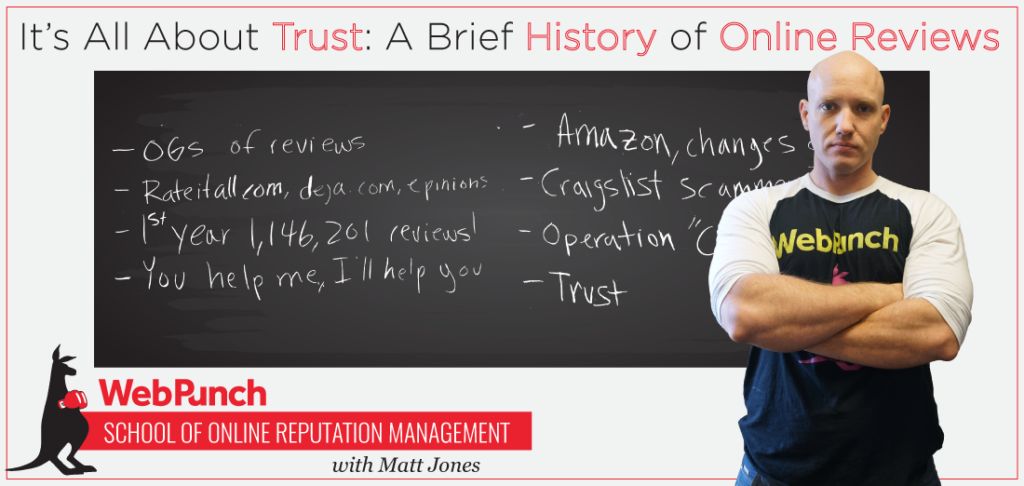I want to take you back to 1999, when cargo pants were cool, when Bill Clinton was having some problems, and I was in college. Swing dancing came back. It was all the rage. And for those of you who don’t know, it’s still a pretty cool thing. But it was during that time when online reviews really started showing up, and there were three original gangsters of online reviews. It was rateitall.com, deja.com, and Epinions. Now, all of those are basically defunct. I think Epinions was the one to last the longest. But all of those have since been acquired and sold off. But during their first year, they accumulated $1,146,201 reviews. So clearly, they were on to something.
And during that time, it was kind of like a lot of businesses going online to bash their competitors, or they would group up with a buddy friend of theirs who owned another business and write each other reviews. So it was kinda like, “You help me, I’ll help you, and we’re using it as a tool to hurt our competition.” The main thing was that it was harder to trust the veracity of those reviews because there weren’t a lot of checks and balances to keep those real. Then along came Amazon. And Amazon changed the game because, obviously, they were getting bigger and bigger and bigger.
But as they grew, they really incorporated reviews as a real big part of their selling platform, and that became a really big part of how important reviews were to the world. But anytime there’s something of value, there’s gonna be people who come in and try to game the system. And so you began to see people on Craigslist saying, “Hey, we’ll write you reviews. We’ll get you reviews for x dollars per review.” And after some time, there began a lot of stings. And Yelp did some stings, and Amazon sued people for posting fake reviews. Eventually, New York State, their attorney general said, “This is a problem that we’ve gotta fix.” So they actually came up with a fake frozen yogurt shop in Brooklyn, and they called this operation “Clean Turf.”
During this operation, they posted about this business and then they started hiring all these companies who were offshore, usually, the Philippines, Eastern Europe, Bangladesh, etc., to start writing them fake reviews and getting them good fake reviews. During that process, they were able to indict and charge 19 different companies, and the FTC stepped in and fined them $350,000. So that became a big deal. Also, as we talked about, there began legislation that regulated reviews and what you can say, what you can’t say, what’s appropriate, what’s inappropriate, etc. The main thing with reviews is it’s about trust. So if you can’t trust the reviews that you’re reading, then you’re not going to use them. That’s why companies like Yelp, Google, Facebook, etc, especially, Yelp, they put a lot of things in place that help protect the ecosystem. So if they think a review is fishy, they get rid of it, etc.
The problem with Yelp, in particular, is that they get rid of a lot of legitimate reviews. So that can be a hard thing for a business owner who is getting legitimate reviews coming in, but they’re getting filtered from Yelp because that person was new to Yelp or they didn’t complete their profile, etc. Those are some tough things. But it’s kind of interesting to see where reviews started and where we are now in being such an important part of how consumers and businesses make purchasing decisions. So I wanted to give you that information. Make sure that you have processes in place that’ll help you get reviews on a reliable basis. And then you can really conquer and set yourself apart from your competition. I’m Matt Jones, and we’ll catch you next episode.

Matt Jones is a co-founder of WebPunch. When he’s not WebPunching, he is exploring the world, taking photos, creating edible art or making gains in the gym. The main love and joy of his life though, is his little boy Mac, who is his best friend.


